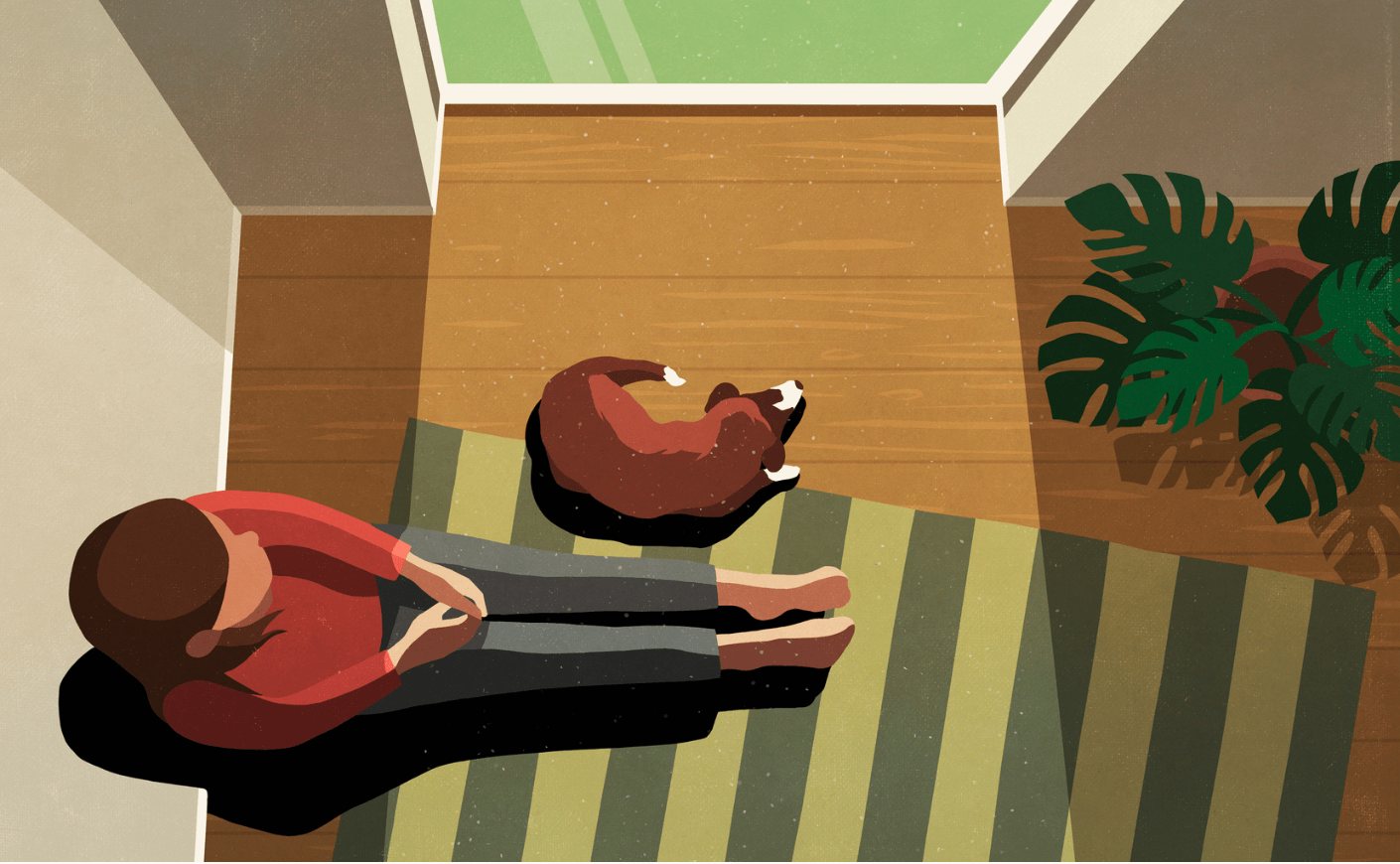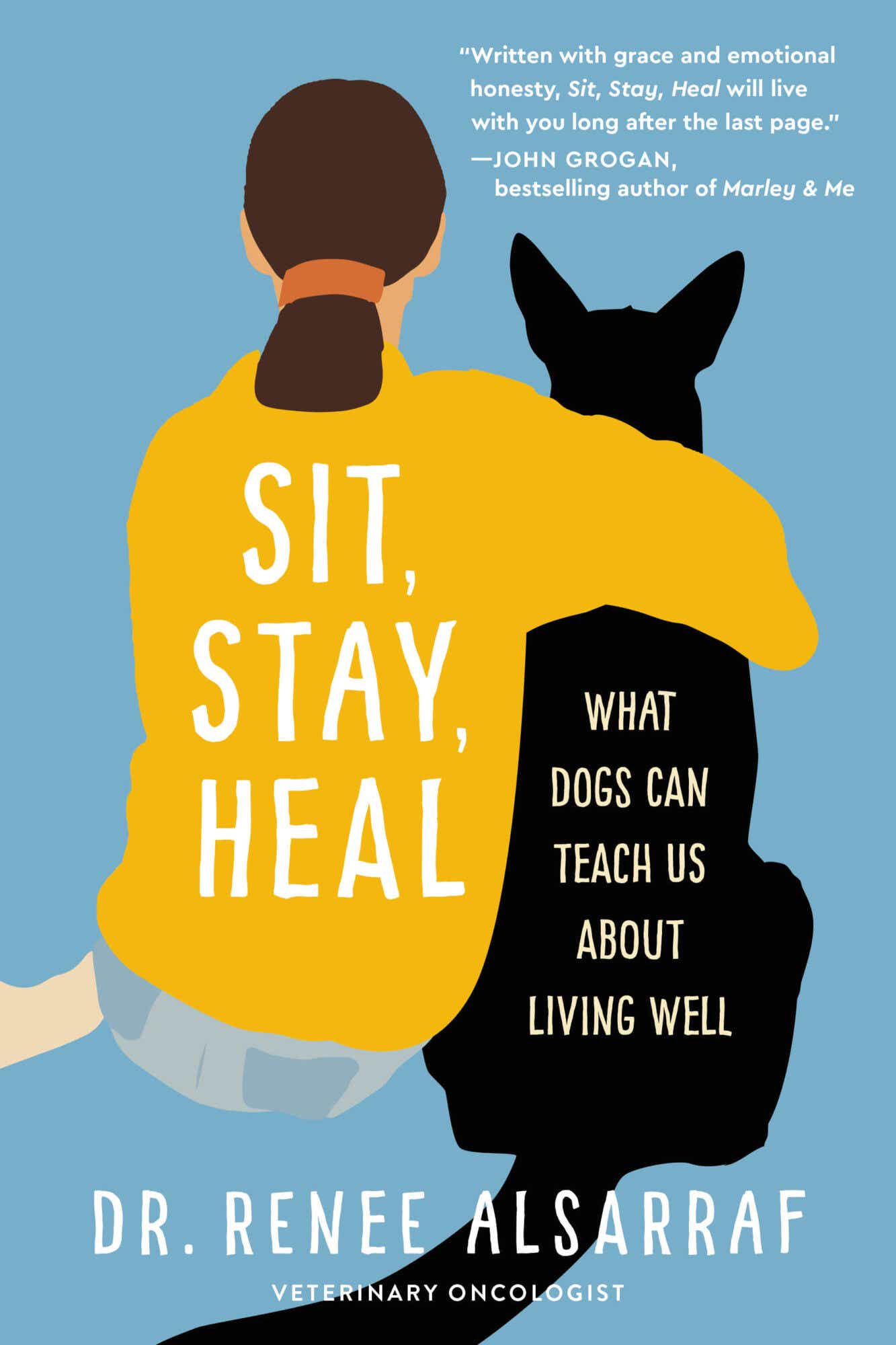Our canine companions serve as incredibly beloved family members, adding routine, humor, and affection to our everyday lives. But as part of that relationship, so many of us are faced with an almost-unbearable moment: Having to say goodbye to them. The new book Sit, Stay, Heal: What Dogs Can Teach Us About Living Well is a collection of inspiring true stories from veterinary oncologist Dr. Renee Alsarraf, with each chapter highlighting a different inspiring, marvelous dog. And though making the end-of-life decision for a pet is never easy, with this book, Dr. Alsarraf aims to validate the grieving process, and give a front row seat to the enormous power that the human-animal bond plays in our lives. In this excerpt from Sit, Stay, Heal, she shares her personal story of losing her own adored pup.
Our boxer, Newton, is the dearest of friends, and an integral part of our family, but the C word, cancer, is taking a toll on his body. I know we’ll soon be faced with a terrible decision that I’ve helped so many families face. No one wants to make that dreadful decision even one day too late, because no one wants their four-legged family member to suffer. But we don’t want to lose a beloved pet one day earlier than we have to, either.
In Newton’s case, for our family, the humane thing is to realistically assess when the battle has been lost and to let him go. As a veterinarian, I know it’s never easy to say goodbye to a loved one. Through good days and bad, our pets provide such unconditional love, support, and companionship. They’re with us for fun times and are also there to snuggle with when the outside world seems too harsh. Newton has been all of these things to all three members of our family. But just as he has made our lives better, we must make his life as good as we can, right to the last moment. I remind myself of what I review with other pet parents when they are nearing the end of life with their cat or dog:
•Is my pet in pain? Veterinary prescription pain medication can help.
• Is my pet eating? Offering other tasty foods or an appetite stimulant may help. Subcutaneous fluids may help with hydration if needed.
• Is my pet active? Lethargy and sleeping a lot more than usual are signs that the disease is taking its toll.
• Is my pet comfortable? Does he/she have the soft bedding that they like; is the room temperature appropriate? Sometimes veterinary prescribed anti-inflammatory medications can help.
• Is my pet happy? Does he/she still want to be with me or does he/she go off alone? This is also another sign that the disease is progressing
When Newton begins to barely eat, and just lay on his dog bed nearly all day, I know it’s time. I reach for the phone and dial my husband who’s away on a three-day business trip. I hadn’t expected Newton to take such a downward turn in only a few days.
We both cry on the phone, say that we love each other, and prepare ourselves to do what must happen next; I text my work team to alert them of our decision. My son Peter and I head to the animal hospital, doing the 20-minute drive in complete silence. It seems to take forever. Though the sun is out, we’re caught in a dense, gray fog.
As Newton, Peter, and I round the corner to the oncology section, Newton begins to slowly wag his little stump of a tail. This is a happy place for him: He grew up spending a lot of time here and knows the staff as friends. He has no fear; only friends are here. My coworker Jackie hugs me for a moment, but then I step back. I need to maintain some level of composure for the daunting task at hand.
“Are you OK, honey?” I ask my son, looking at him longingly. He nods a yes. Peter is stoic, standing at Newton’s face, stroking the velvety wrinkles on the dog’s forehead. I reach over and squeeze my brave son’s hand. Now the rest is on me.
Euthanizing a pet, anyone’s pet, is quite emotional. During this time with a family, I am so sad myself that I need to cry, yet I need to be present to comfort the grieving people as best I can. I struggle to hold back my tears in order to see the vein in which I have to place a catheter. This time, it’s my own dog on the table.
By the grace of God, the catheter goes in with the first stick. Forever trusting, Newtie does not move. He feels safe in this space. He is set to receive two different medications. The first will be a tranquilizer overdose, so that he will go into a very deep sleep. The second injection will actually stop his heart and his lungs from working. The whole process may take only a minute or so.
I take a deep breath and let the air out slowly. I can do this, I tell myself. Please, hands, keep steady. I reach for the sedative, connect it to the catheter, and begin pushing it from the syringe into the vein. I softly talk to Newton as I am doing this: “Good boy, sweetheart,” “Newtie is such a good boy,” “We love you sooo much, good boy,” I say. Please, Lord, let me be able to do this. I look back down and take the next, final, syringe. Moments seem forever. When the syringe is empty, I set it down and grab my stethoscope from around my neck to listen. He has no heartbeat; he has no breath. Newton has passed.
All three of my coworkers are crying. They step out of the room quickly, quietly, to give my son and me some time. He and I hug a deep, long hug. At first, he doesn’t cry, but I know to hang on longer. Finally, with our continued embrace, he begins to weep, deeply, and of course I cry as well. It breaks my heart to see my son so brokenhearted. I don’t let him go until his tears stop.
I tell my son, “Each dog is different; each teaches us something different. And I think they’re placed in our lives at different times, for just that purpose. It doesn’t take away the fact that this really hurts, but I promise that it’ll get more bearable.”
We both turn to Newton’s body lying on the table. Somehow one of my staff members has come in and covered him with a soft blanket; I’m grateful for their kindness. Newton’s head is not under the blanket. I tell my son I love him, and then we turn to pet our dog.
From SIT, STAY, HEAL by Renée Alsarraf and reprinted with permission from HarperOne, an imprint of HarperCollins Publishers. Copyright 2022.










